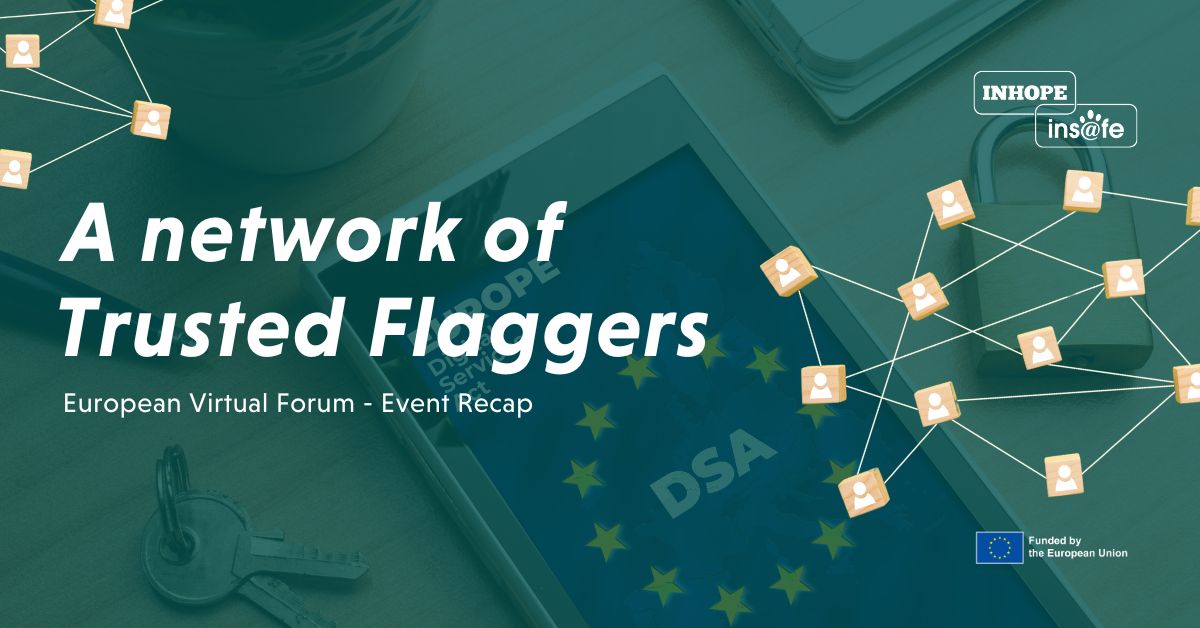Article
Events & Campaigns
A Recap of the European Virtual Forum 2024
The 2024 European Virtual Forum under the theme ‘A Network of trusted flaggers’ created a space for discussion, knowledge-sharing and best practices around the implementation status of the Digital Services Act (DSA) and the application process for those aspiring to become Trusted Flaggers.
We commenced our day with a welcome address delivered by June Lowery-Kingston from the European Commission. She underscored the profound value of each participant's diverse perspectives in enhancing our understanding of stakeholder experiences during the initial phases of DSA implementation. With their background as prior 'informal' flaggers, the INHOPE and Insafe networks bring extensive expertise to the table critical for informing and guiding these processes. June highlighted the pivotal roles of helplines and hotlines in aiding Digital Services Coordinators (DSCs) to effect tangible change, drawing upon our networks' wealth of experience with harmful conduct and content in the digital sphere.
A Progress Update on the DSA
We continued the day with Senior Policy and Legal Advisor Martin Harris-Hess, who provided a high-level progress update on the implementation of the DSA. While regulations for the 19 designated Very Large Online Platforms (VLOPs) are overseen and enforced by the European Commission (EC), other aspects of the DSA are overseen by different entities, like the DSCs. At this point in time, almost all Member States have designated their DSC's and are aiding the EC in the successful rollout of the DSA on national level, acting as liaisons for the EC to coordinate actions within Member States. The DSCs also offer guidance to the European Board for Digital Services - a temporary advisory group comprised of national DSCs - which has already convened several times to discuss the approach and progress of the rollout.
Becoming a Trusted Flagger under the DSA
With the objective of offering clear guidance to participants on how to become a Trusted Flagger under the DSA, Bence Kertész, Policy Officer at the European Commission elaborated on the specific requirements applicants must meet:
- Only entities, not private individuals, can become Trusted Flaggers.
- Applying organisations can be public, semi-public, NGOs, or private (Recital 61 of the DSA mentions semi-public bodies like those in the INHOPE network for reporting CSAM).
- Trusted Flaggers must possess expertise in detecting and notifying illegal content and be independent from online platforms.
- Diligence, accuracy, and objectivity in submitting notices are crucial.
- Each case will be independently assessed by the respective Digital Services Coordinator.
- Trusted Flaggers must report annually on notices and actions taken throughout the year.
- DSCs can revoke Trusted Flaggers status if conditions are not met, and online platforms must report invalid notices.
The key focus points for the Insafe and INHOPE networks is to support our EU members in the effective rollout of the Trusted Flagger program. To gain a better understanding of our members' progress we asked them to provide feedback on their experiences with the Trusted Flagger Program to date.
Feedback from the Insafe/INHOPE Networks
Key themes included the varying progress stages across the EU, both for Trusted Flaggers and Digital Services Coordinators, due to differing bureaucratic hurdles. While several organisation have already applied for Trusted Flagger status in their countries, others are still waiting for the designation of their national DSCs. Concerns were also raised surrounding certain Trusted Flagger requirements, including:
- Annual Reporting: Trusted Flagger applicants are expecting more stringent reporting requirements, that are not being met by their current Annual Reports.
- Capacity and Funding: Added Trusted Flagger responsibilities, including the annual report requirements, have raised concerns about potential shortcomings in capacity and funding.
- Trusted Flagger Independence: While the EC has confirmed that receiving funding from Industry will not affect Trusted Flagger independence status, this requirement is being interpreted differently on national level and can therefore vary across the EU. This raises concerns for Trusted Flagger applicants who rely on industry funding.
- Experience requirement: In some countries, national regulation requires Trusted Flaggers to have at least 5 years of experience as an informal flagging organisation. Younger organisations with extensive expertise are therefore at risk of not being considered as Trusted Flaggers.
Next Steps for INHOPE
Both Insafe and INHOPE networks are well trained experts on the subject of processing and flagging harmful content. Therefore the INHOPE team aims to provide the best possible support and guidance to any organisations within the network applying to become trusted flaggers. Our key areas of focus will include:
- Capacity Building: Emphasising the priority of increasing capacity in regards to Financing, Personnel, Training, and Technology following the full rollout of the DSA across the EU.
- Creation of Guidelines & Mapping of Network Progress: INHOPE is creating a guideline for the TF application process including an overview of our members application progress. This mapping will allow us to offer more tailored support to individual members.
- EU Consultation: Utilising the network's experience and expertise we are working to consult and shape the Commission's creation of DSA guidelines on the EU and National level.
- Advocacy and Support: The recast of the CSAM Directive expands the hotline mandate, and advocacy based on this directive will be prioritised to better support TFs in the EU.
- Collaboration and Standartisation: Promoting experience sharing, harmonisation and standardisation among members and partners to ensure effective implementation and prevent duplicate efforts.
Don't miss out on our future events, and stay informed about the next European Virtual Forum by signing up to our mailing list.
This event was funded by the European Commission as part of the Better Internet for Kids Programme under the Digital Europe Programme (DIGITAL).

Don't miss out on our future events, and stay informed about next European Virtual Forum by signing up to our mailing list.
'